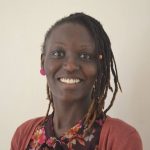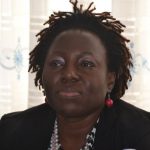Two participants in the Women’s Health, Masculinities and Empowerment: Advocacy and Training course, which is currently being taught in Nairobi, Kenya, share their prized lessons from Monday’s (07 September 2015) sessions.
Dr. Serah Gitome is an epidemiologist and medical doctor from Kenya:
 Dr. Eunice Muthengi’s presentation on Micro-saving and safe spaces with girls as well as our discussions on Paul Freire’s readings took the day. I would say the discussions on Freire’s readings stood out the most. Of importance were Freire’s readings as they helped me better ground my understanding of how oppression gets perpetuated and how the oppressed can get out of their oppression. The concepts of generating critical consciousness among the people who need “liberation” from their oppression or disempowerment can be applied in gender- transformative interventions. I hope to apply the concepts I learnt in designing a gender-transformative intervention addressing transactional sex among fisher-folk communities along Lake Victoria in Kenya.
Dr. Eunice Muthengi’s presentation on Micro-saving and safe spaces with girls as well as our discussions on Paul Freire’s readings took the day. I would say the discussions on Freire’s readings stood out the most. Of importance were Freire’s readings as they helped me better ground my understanding of how oppression gets perpetuated and how the oppressed can get out of their oppression. The concepts of generating critical consciousness among the people who need “liberation” from their oppression or disempowerment can be applied in gender- transformative interventions. I hope to apply the concepts I learnt in designing a gender-transformative intervention addressing transactional sex among fisher-folk communities along Lake Victoria in Kenya.
Nyaradzo Mashayamombe, a human rights activist from Zimbabwe:
 One aspect of today’s training that stood out was the Pedagogy of the Oppressed. I am a human rights activist who focuses mainly on girls, young women and young people’s issues. This group of people deals with power issues and oppression of their rights every day. It is not a secret that women and girls are at the receiving end of oppression, and for me as one who fights for these rights, it’s empowering me to know the real dynamics of oppression and the oppressed, and to be able to put names to the processes of violation of rights and to know what’s really at play, such as processes of humanisation and dehumanisation. The knowledge that the power to end oppression is in the oppressed and that it’s the oppressed who can put an end to the oppression by radically emerging out of it, is one truth that I am forever grateful for and it’s extremely empowering. By the end of the course, I will be more empowered to explain and build conscience to the girls, young women and men that I work with to educate them on the dynamics of oppression and how they can come out of it.
One aspect of today’s training that stood out was the Pedagogy of the Oppressed. I am a human rights activist who focuses mainly on girls, young women and young people’s issues. This group of people deals with power issues and oppression of their rights every day. It is not a secret that women and girls are at the receiving end of oppression, and for me as one who fights for these rights, it’s empowering me to know the real dynamics of oppression and the oppressed, and to be able to put names to the processes of violation of rights and to know what’s really at play, such as processes of humanisation and dehumanisation. The knowledge that the power to end oppression is in the oppressed and that it’s the oppressed who can put an end to the oppression by radically emerging out of it, is one truth that I am forever grateful for and it’s extremely empowering. By the end of the course, I will be more empowered to explain and build conscience to the girls, young women and men that I work with to educate them on the dynamics of oppression and how they can come out of it.
[The course is a partnership among Sonke Gender Justice, the UCGHI Center of Expertise on Women’s Health and Empowerment and MenEngage Africa.]
